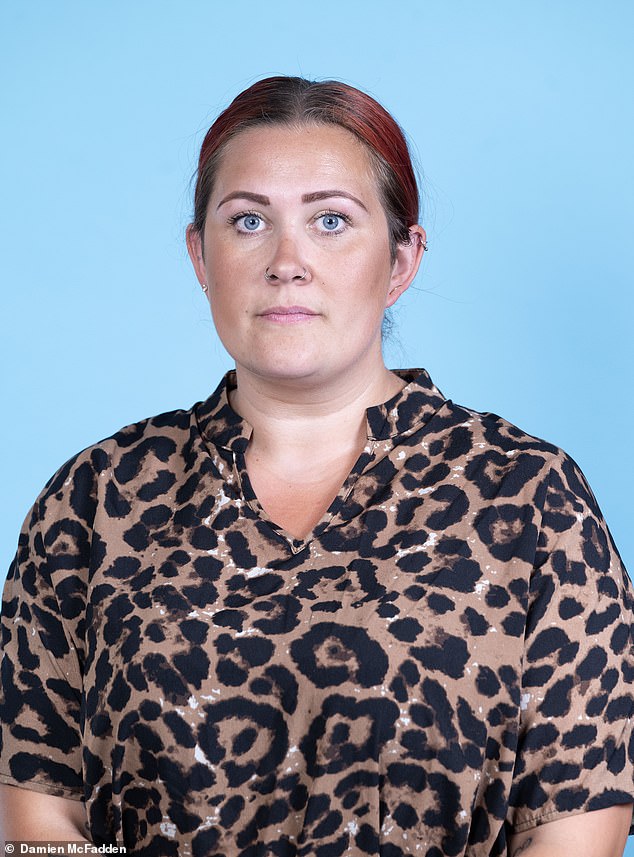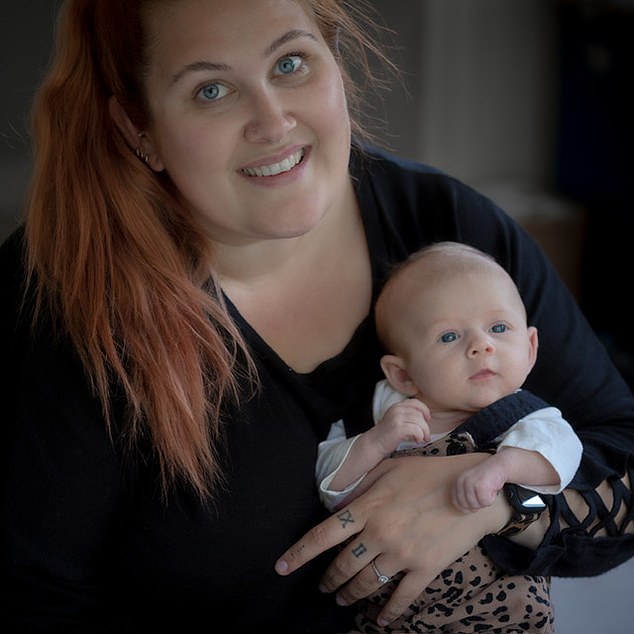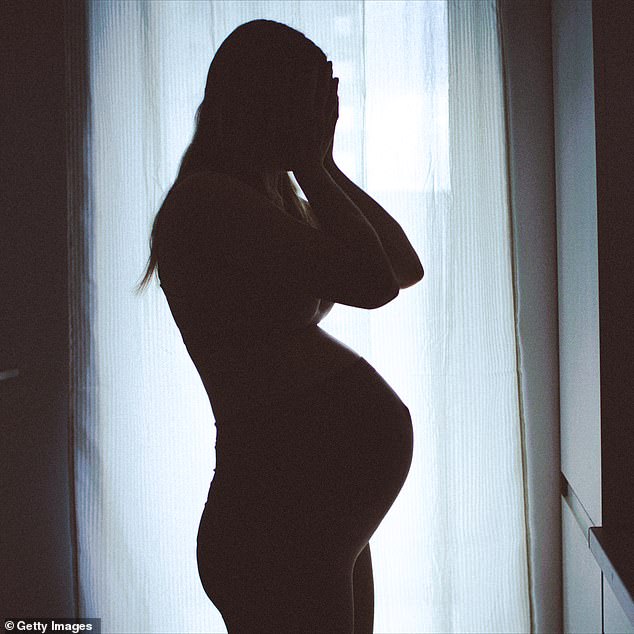Pregnant with a longed-for child, Kerry Clifford expected to feel a sense of elation. She had endured three miscarriages and an ovarian ectopic pregnancy, where the fertilised egg develops outside the uterus, and so Kerry was initially relieved when her fourth pregnancy ‘stuck’.
But that relief was soon replaced by wretched feelings of despair.
Kerry, who had never experienced mental health problems before, would put on a ‘happy face’ during the day at work as a palliative care assistant in a care home – but ‘as soon as I got home, I’d crash’, says the 32-year-old from Horsham in Sussex.
‘I wasn’t happy. I was desperate, constantly worrying about the pregnancy and the future – was I harming the baby by being on my feet all day? Would she survive the birth? Would I be a good mum? I felt after such a battle to stay pregnant, I should have been enjoying it.
‘I should have been wearing a lovely summer dress and “glowing” but I felt awful: I was exhausted, I had intrusive thoughts, imagining I was bleeding and the baby had stopped moving.’
She didn’t know it at the time, but Kerry was experiencing prenatal depression, which can affect expectant mothers at any point from conception.
While most people are familiar with postnatal depression, defined as depression that affects mothers in the year after giving birth, prenatal depression – while less often discussed – is as common, if not more so.
According to official figures postnatal depression affects 10 per cent of new mothers, while prenatal depression is thought to affect one in five (20 per cent) of women who give birth in England every year – around 112,000 women.

Kerry Clifford suffered with prenatal depression, saying: ‘I felt awful: I was exhausted, I had intrusive thoughts, imagining I was bleeding and the baby had stopped moving’

Kerry pictured with her newborn daughter Reenie in 2022. The depression stopped after Kerry gave birth, but returned when she became pregnant again a year later

Dr Livia Martucci, a consultant perinatal psychiatrist and clinical lead for perinatal services at South London and Maudsley NHS Foundation Trust, says a history of mental illness can mean a higher risk of developing prenatal depression
Most experts believe the true number affected by prenatal depression is likely to be higher still. Research by The Boots Family Trust Alliance in 2013 found that 70 per cent of women hide or underplay their mental health symptoms during pregnancy for fear of judgment.
Kerry didn’t even tell her husband, Joe, 34, who works in office construction, how she was feeling for fear of worrying him. But at 30 weeks into the pregnancy, Kerry’s midwife became concerned and advised her to talk to the perinatal mental health team at her local hospital – and she was referred for weekly counselling.
‘It was a total life-saver because I felt so lonely and guilty – I’d longed for this pregnancy, yet I was hating every moment of it,’ says Kerry.
But her problems didn’t end there. After giving birth to a healthy baby girl, Reenie, in 2022, Kerry became pregnant again just over a year later with daughter Orlaigh. The depression returned but was far worse.
‘I’d lie in bed crying, not wanting to be here,’ says Kerry.
‘Daily, even hourly, I’d say to myself, “I can’t do this any more”.’
She felt so awful she considered a termination, and even ending her own life.
‘Every day was a battle to stay sane and silent – I felt friends and family would judge me if they knew how I felt.’

A study published in 2018 by Dr Rebecca Pearson, a lecturer in psychiatric epidemiology at the University of Bristol, found an alarming 50 per cent rise in prenatal depression in a single generation

The National Institute for Health and Care Excellence (NICE) warned in 2020 that there was evidence that depression during pregnancy and postpartum was commonly missed or undertreated in general practice
Kerry also suffered from hyperemesis gravidarum (HG), a severe form of nausea and sickness: ‘I’d be sick multiple times a day, but it was the mental torment that was unbearable.
‘I had intrusive thoughts that were worse in the middle of the night when I’d wake up drenched with sweat imagining the baby was dead. The only reason I didn’t try to hurt myself was because my beautiful daughter Reenie, then aged just 18 months, needed me.’
Prenatal depression can cause anxiety, anger and irritability, a feeling of worthlessness, difficulties sleeping and suicidal or intrusive thoughts of harm about the baby – yet women often try and underplay their symptoms, not just to friends and family, but to medical professionals, too.
‘Many women work hard to maintain a “mask” during pregnancy, to meet expectations that it should be a joyful, glowing time,’ says Dr Caroline Boyd, a perinatal clinical psychologist based at the independent practice, Parent Therapy Hub, in Hertfordshire.
‘But for 7 to 15 per cent of women, symptoms of anxiety and depression begin during pregnancy and continue after the baby arrives.
‘Admitting to feeling difficult emotions during this time can feel shameful – especially in a culture that idealises pregnancy as a universally joyful experience and frames motherhood as a defining marker of womanhood.’
Why some women develop prenatal depression is not clear. Hormones and genes may play a part – but it’s thought other factors may be involved, too.
There are known risk factors, says Dr Livia Martucci, a consultant perinatal psychiatrist and clinical lead for perinatal services at South London and Maudsley NHS Foundation Trust, and a spokesperson for the Royal College of Psychiatrists.
She says: ‘These include: a history of mental health difficulties; previous trauma, including abuse or neglect; complications in past pregnancies, such as miscarriage or traumatic birth; and a lack of social support.’
‘It can affect any age but it’s slightly more common in younger mums [under 25] and older [over 40],’ adds Dr Boyd.
Worryingly, the numbers affected appear to be growing.
A study by the University of Bristol, published in 2018, found an alarming 50 per cent rise in prenatal depression in a single generation.
The study questioned pregnant women aged 19 to 24 between 1990 and 1992, and then between 2012 and 2016.
High depression scores were recorded for 17 per cent of the first group and 25 per cent of the second, a change the authors blamed on the growth in popularity of social media.
‘Social media gives a false impression that pregnant women are coping better than they are,’ says the study’s author, Dr Rebecca Pearson, a lecturer in psychiatric epidemiology at the University of Bristol.
The National Institute for Health and Care Excellence (NICE) warned in 2020 that there was evidence that depression during pregnancy and postpartum was commonly missed or undertreated in general practice.
‘One of the main challenges is how much time we have with our patients,’ says Professor Margaret Ikpoh, vice-chair of the Royal College of GPs. ‘In a ten-minute consultation the physical symptoms of pregnancy tend to get the most attention.
‘It’s often only once you have been able to build a rapport with the patient, that they might mention something that indicates they might need some support with their mental health and wellbeing.
‘Major red flags are a patient wanting to harm themselves.
‘But there are other things we look out for – if they seem detached, for instance, or are struggling to take care of themselves. The earlier we can help them access treatment or support the better, as perinatal mental ill-health can have a profound impact on women, their families and their babies.’
Yet Kerry’s experience demonstrates the struggle women experiencing depression during their pregnancy or after giving birth can face to get support.
Kerry was 36 weeks into her first pregnancy when she suffered a placental abruption – where the placenta comes away from the wall of the uterus, causing heavy bleeding and pain.
‘I woke up at 3am in a pool of blood and was rushed to hospital by ambulance.’
She needed an emergency caesarean. The baby appeared healthy, and she and Kerry went home 24 hours later.
But ‘then all the postnatal fears kicked in’. Kerry recalls: ‘Is she breathing? Is she thriving? The midwives came to my home and did a standard check on day one, then a day five check – and then, as everything was normal with the baby, left me to it.’
After the counselling stopped at the end of her pregnancy, Kerry eventually found informal support via the mums’ app Peanut.
‘I started chatting to another new mum via the app,’ she recalls.
‘Our babies were born in the same hospital, by caesarean, two weeks apart – she understood me and what I was going through: feeling lonely, anxious and afraid, and that made it feel normal.
‘I felt validated when she said, “I feel that too”.’
But when pregnant again 14 months later with Orlaigh, suffering from HG and with her mental health getting worse than before, Kerry sought help from her GP.
‘After being dismissed by my GP many times I demanded to see a consultant obstetrician – I told him that I had thought about ending the pregnancy and that dying would have felt better than what I was experiencing – but even at that point I wasn’t offered help or referred to any mental health team.’
As soon as Orlaigh was born at 38 weeks (again Kerry had a caesarean) the nausea lifted – and Kerry’s mental health improved.
‘I think if I had been given mental health support and coping mechanisms to understand how pregnancy can affect your mental health, I would have coped better than I did,’ she says.
In fact, her hyperemesis gravidarum might have also played a role in making the depression worse, says Dr Martucci.
‘There is increasing evidence that HG can be linked to depression in pregnancy, not only because of the distress and discomfort of feeling nauseous and vomiting most – if not all – of the time, but also because of the frustration that comes with loss of functioning,’ she told Good Health. ‘Some people struggle to even move their head without being sick, which means they struggle to look after older children or have to be signed off work.’
But what kind of support do women need?
While there is evidence that women with both pre- and postnatal depression respond very well to talking therapies such as cognitive behavioural therapy (CBT), the NHS struggles to meet demand.
According to NHS England, more than 57,000 new and expectant mothers received specialist support for mental health problems in 2023/4, a third more than in 2022.
Yet analysis by the Royal College of Psychiatrists has found that almost two-thirds of integrated care boards in England, the bodies that make local NHS funding decisions, are planning to cut funding to perinatal mental health services by £3.6 million, despite increased demand.
The National Childbirth Trust believes such cuts will mean some women will take their own lives.
Maternal suicide continues to be the leading cause of deaths of women between six weeks and a year after the end of pregnancy, according to the 2024 report by MBRRACE-UK [Mothers and Babies: Reducing Risk through Audits and Confidential Enquiries across the UK].
Annie Belasco, chief executive of the charity PANDAS, which offers support to women suffering perinatal depression (or PND, the umbrella term for both prenatal and postnatal depression) believes one simple improvement would be to warn prospective parents about the risk of perinatal mental health difficulties from conception.
‘There should be much more awareness that your feelings can be very up and down and that a ‘perfect pregnancy’ isn’t achievable,’ she says.
‘Some women are incredibly frightened about bringing a child into the world when so many seismic events are happening. Social media is their worst enemy. There is so much comparison, so many unrealistic expectations.’
She talks from experience. After a breast cancer diagnosis and treatment aged 25, Annie feared she would never conceive – so when she became pregnant in 2014, aged 33, ‘it was like the rainbow after the storm, a new beginning’, she says.
But the elation didn’t last long. She also suffered from HG and maternal OCD, where she felt compelled to complete lengthy rituals every day.
‘I had intrusive and frightening thoughts throughout my pregnancy, exacerbated by my anxiety and depression not being taken seriously and treated,’ she says.
‘I was constantly calling my GP and midwife. I’d sit in my house with the curtains shut, just to feel safe.’
Annie’s obstetrician prescribed an antidepressant – sertraline – which she was reassured is safe to be taken in pregnancy and she was offered a place on a waiting list for therapy.
Annie says: ‘I felt I was in crisis, but because I hadn’t had suicidal thoughts, it wasn’t enough for an urgent referral to the perinatal mental health team.’
She began seeing a therapist privately – which helped. She phoned PANDAS and found support in talking to others who’d had similar experiences.
PANDAS runs online support groups and provides regional face-to-face groups run by trained volunteers. Around 50 per cent of the 5,000 women who get in touch with the charity each year are suffering from prenatal depression.
‘We know that peer support is very powerful because you get instant empathy and understanding,’ says Annie Belasco.
The Royal College of Midwives has been calling for a dedicated perinatal depression specialist midwife to be employed by every NHS trust and believes that maternity professionals should show equal concern to mental and physical health in pregnancy, childbirth and the postnatal period.
Two years on Kerry, a stay-at-home mum, can’t imagine wanting to hurt herself or end a much-wanted pregnancy.
Reenie is now three, and Orlaigh, two – but while Kerry’s husband would like to try for more children, she will not put herself through another pregnancy.
‘When I was carrying both girls, I was a shell,’ she says. ‘I felt so ashamed, as if I was failing at the thing all women are supposed to do well.’











